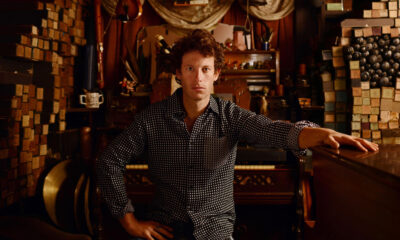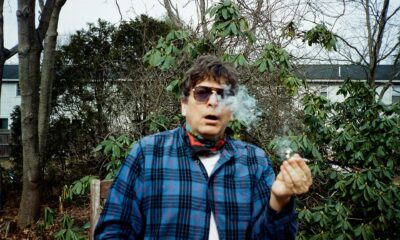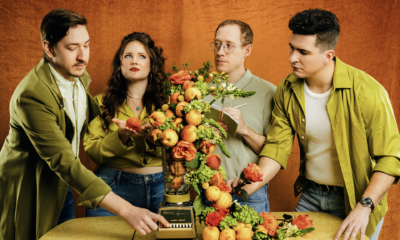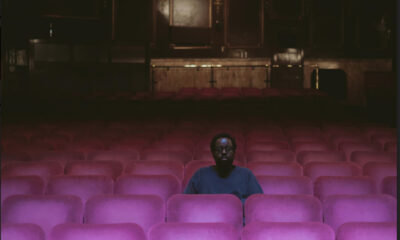Interviews
Agnes Obel Interview; The Singer/Songwriter on Claude Debussy, David Lynch, Musicality and Her Writing Process
Hours before her Toronto performance on what turned out to be one of the coldest nights of the winter so far, Agnes Obel talked candidly about her new album, her musicality, David Lynch and singing in English.

On her third album, Citizen of Glass, Agnes Obel delivers another collection of beautiful atmospheric songs. Unlike Philarmonics and Aventine, Citizen of Glass utilizes an overall concept (the glass human) using a battery of subtle instrumentation which marks a change in her writing style and musicality. At the same time, the album manages to fit right in beside Philarmonics and Aventine as a natural-sounding progression of her unique approach to piano music.
Obel is touring Citizen of Glass in earnest in 2017, having just finished a four-week run of dates in North America performing as a four-piece band. European dates throughout the coming months will follow, with further touring to be announced. Hours before her Toronto performance on what turned out to be one of the coldest nights of the winter so far, Obel talked candidly with PureGrainAudio about her new album, her musicality, David Lynch and singing in English.
I was initially drawn to your music because David Lynch remixed one of your songs for the expanded Aventine album. How did that remix come about?
Obel: Um, I’m not sure, honestly. It was nothing we had planned.
That’s pretty impressive. He’s such a great director and has such an ear for music. To have him take an interest in you is huge.
Obel: Yeah. I remember that summer when we suddenly got this remix sent to us from the label and they said that David Lynch did a remix of your song. That was a ‘WOAH’ moment. My boyfriend and I were just driving around Berlin listening to the remix and were just blown away by the idea that David Lynch made it. And then also that we really liked the remix. I liked how he treated the vocals on it. It was a different rhythm. He somehow found another pulse within that song. It’s very, very nice. So yeah, it’s very cool. (laughs)

I was looking on your social feeds, and noticed that you are attached to a musical showcase at SXSW with a Twin Peaks theme. They are re-launching that show later this year.
Obel: I am, yes. Showtime is doing that this May. That’s great. I’m looking forward to that. I’m excited about it. His Twin Peaks world, it was something that I grew up with. I think everyone from my generation grew up with Twin Peaks, the shows and the music, and the dialog that seemed to happen between those two worlds. I’ve been very inspired by this. I think David Lynch is always making these two elements a very important element in his projects, intertwining musical sounds and visuals. That is inspiring if you are making music yourself. I’m super excited to have this element in my life.
It’s amazing. Do you think any of your music will be used at all in these new episodes coming up? Has that topic been broached with you at all?
Obel: I haven’t heard anything, no. But I can imagine that David Lynch can choose whatever he wants. (laughs) Nobody is going to say ‘no.’
Would you mind describing what you were like as a child, Agnes? Specifically, how you became musical and steered yourself towards the career that you have now?
Obel: Yeah. I think I was a very happy kid. I played the piano when I was 5 or 6. Nothing too seriously, just some lessons and stuff. And then I started playing in a band. I went to a school that was very open to music. They had a lot of different band projects. And the kids in my class, there were a lot of them with proficient musicians as parents. So there was a very sort of music focused environment. I was lucky, anyway, because the class I went to was like that. So there was a band very early on in our class, and I played in that band and as a teenager, I continued. It was more from my own relationship with the instruments at this time, figuring out the instrument and then having to learn different pieces that I really got into music. I really discovered the almost transcending power of music. And I think that is why I am so into it.
I did an interview while I was in Ottawa where I had a similar question, and it was talking to them that I kind of discovered that maybe some of these things that I learned as a ten or eleven-year-old playing classical piano and so on. I was listening to all of these classic piano pieces. For instance, the first longer piece that I played was called “Clair de Lune” (Claude Debussy), and I was not so good at reading music, so I was just listening to this CD repeatedly that my parents had suggested that I buy. I had this sort of crazy experience when I listened to it where I felt somehow lifted out of the room and I saw myself from above while it played. That was while the song was building. It gave me the feeling that I could become one with something that is bigger than myself. I had that experience with the song. And I think that today, I somehow still strive to do that with my own music, you know? In a way, the whole band stuff – all of the bands that I’ve played with, in a way, what I’m doing now has very little to do with that. I think it has more to do with how I experienced that music on my own.
Check out the video for the song “It’s Happening Again”
Do you think that musicality is something that can be learned by everyone? Or do you feel it’s more like something that is inherent and natural within you?
Obel: I think we all have it. It’s like Oliver Sacks, his book Musicophilia, which talks about this guy who gets hit by lightning and suddenly he just has this urge to play the piano. The guy is an eye doctor or something, and he drops everything just to pursue music. I think that we all have it, but we need to be opened up to it. Maybe I had that experience when I was ten or eleven years old hearing “Clair de Lune” – similar to being hit by lightning because that is how it felt to me. I’d played music before that, but that was when I really got struck by it. So I think we all have it, it’s just a matter of being opened up to it.
Are you the kind of artist who can write when you are touring? Do you find you are making notes when you are on the road?
Obel: I have to be isolated and focused. It doesn’t go very well on the road. I always try and plan to and it winds up not happening. I need to come to the music and utterly focus on poetry and writing. I need much more calm and peace, and can’t do it on the road.
Can we talk about your approach to Citizen of Glass? Was that an idea or concept that you thought out prior to writing?
Obel: Yes, it was pretty much the first time that I worked like that. I knew that some contemporary composers like Scott Walker and some soundtrack composers they work with a title or a theme in mind and create a sort of an informed arrangement. And I just wondered how that might be if I used that approach in the arrangement in some of my own songs. I wanted to see if I could sort of push myself into another sound or even another mood. Also I wanted to try writing about subjects that I normally wouldn’t write about. So I was looking for a concept, and then I found this gläserner Mensch, which is what it’s called in German. It means glass human or glass citizen. And I felt like I could explore that from different perspectives. For me it made sense as a cynical thing, experiences being made of glass, and being fragile in different ways. It felt like something I knew, and something I could express musically in different ways.

I’m curious what your demos sound like. How close to the final mastered versions of the songs that we all get to hear are the little noodles and explorations that you put together on your own?
Obel: It’s very close. Some of the songs I keep even the first thoughts. Very often the vocals on my songs are the first takes. And then I add this and that to them to enhance them as I work. “Trojan Horse” was this simple (Obel hums the main piano structure of the song lightly) sound and I just built the song from there (She does the same thing with “Familiar”, hums the main fabric of the track, and says the song built quickly from that initial structure). For me, it’s very much about that initial sound or the initial tones I imagine, and then I build the whole song around it. And then I record it very early on, so I often have the demo version included in the actual song.
I keep a lot of musical friends. I go to a lot of shows. A few of these friends saw that I was coming out tonight for tonight’s performance, and they were asking me what your music sounds like. I’ve never really tried to describe your music in that sense, and I drew a complete blank. I wound up sending them the link to Citizen of Glass on Apple Music and saying “just play it”. It made me wonder how you describe it? You must get asked this same thing quite often.
Obel: Yeah. I have problems with it too. I just say that I write my own sort of things on the piano and then add in that I also like to play other instruments. And that I sing. I try not to give them much more than that. I like to keep people’s minds as open as possible. I think one thing I could say is that I like minimalism in production. I know I had a lot of instruments on this album, but still, it’s still quite minimal. Aventine was three, maybe four different instruments. I think that is what I’d say though, keeping it simple in regards to instrumentation.
Did you know when you were recording Citizen of Glass that you would tour it as a four piece then, and not just yourself on a piano?
Obel: Yeah, I knew I had to do that. I had percussion and a lot of orchestral parts. So I knew I had to find cellists who could loop. I knew I needed two cellists. Yeah, I knew it was going to be different. I knew that would give me bass and strings. Otherwise, I’d have to have a really big band to pull it off, and I don’t really like it when there are too many people on stage.
I can’t see you moving around a lot when you perform these songs. From instrument to instrument maybe, but you are not going to bang into each other or cut each other off doing scissor kicks or anything.
Obel: Oh yeah. But we are all doing a lot. And the more you do, the harder it is to move around. But when we played in Quebec city, they had this camera on stage and they were filming and they were projected that footage behind us on the backdrop and I think it was very good because people could see what we do as we perform a bit better. Sometimes I think that it’s not obvious at all how crazy it is with the two cellists – and what they do each night on these songs.

I’ve only ever heard you sing in English. Is any of your music available in your native tongue?
Obel: No. I haven’t written in Danish.
Interesting. That’s kind of cool. I was expecting to find a European Agnes Obel pressing of an obscure early album in Danish, and was surprised that it didn’t seem to exist.
Obel: Yeah. I don’t know why. I think maybe that I got to know music in English, and it felt like the way I should create it. When I played in bands as a kid, we were performing in English too. Even at school, we were singing songs in English before I even understood it. So I think that it’s been sort of logical. I don’t think that Danish music is really linked to this sound of mine. I don’t care that much for Danish music. Swedish on the other hand, a similar language to Danish but words are pronounced differently, I like that much more. If I shouldn’t sing in English, I think I would sing in Swedish. I’ve also heard a lot of Swedish music as a kid, so I have more of a musical relationship with that language.
Rather than ask you who your influences are, I’d be more curious to know what songs you’d put on a playlist. Say if you were traveling or you were going to exercise or something.
Obel: I like all kinds of music. So I’ve been listening to a lot of instrumental music, Tortoise albums. Nineties music. Some droney stuff. I like Hazelwood . It really depends on what I have to do. For example, when I’m flying, I really like to listen to piano music. Something impressionistic, loud and beautiful. Flying can be such a claustrophobic experience, it’s nice to open that up a bit with music. You need something that opens your mind. Also Radiohead . Pink Floyd or something like that. For me, impressionistic music, and Pink Floyd and Radiohead are all sort of the same. Pink Floyd especially. They are a sort of an open band. And then sometimes I like to listen to really old blues or something really medicinal on a Sunday morning.
Lastly, I am curious about this…. A lot of your shows on this North American tour are selling out. Are you cognizant of how you are finding your audience in North America?
Obel: I have no idea. At all. I’m just really happy that it is happening, but I have no idea. I also don’t know how it’s happening in Europe. It’s all just a bit of a mystery to me. But I’m really happy about it. It’s really cool. I’m going to places I’ve never been before and playing there, and these shows are always selling out. That’s just very cool.
That’s very flattering.
Obel: Yeah, it is. Also, my songs don’t really get a lot of radio airplay or anything, so I have to be very thankful, I know.
-

 Alternative/Rock7 hours ago
Alternative/Rock7 hours agoThe V13 Fix #010 w/ High on Fire, NOFX, My Dying Bride and more
-

 Hardcore/Punk7 days ago
Hardcore/Punk7 days agoHastings Beat Punks Kid Kapichi Vent Their Frustrations at Leeds Beckett University [Photos]
-

 Alternative/Rock6 days ago
Alternative/Rock6 days agoA Rejuvenated Dream State are ‘Still Dreaming’ as They Bounce Into Manchester YES [Photos]
-

 Culture1 week ago
Culture1 week agoCirque Du Soleil OVO Takes Leeds Fans on a Unique, Unforgettable Journey [Photos]
-

 Music1 day ago
Music1 day agoReclusive Producer Stumbleine Premieres Beat-Driven New Single “Cinderhaze”
-
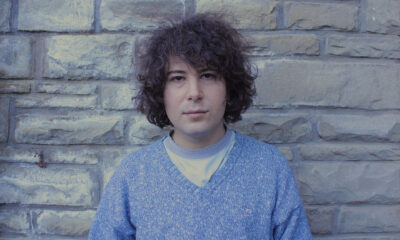
 Indie1 week ago
Indie1 week agoMichele Ducci Premieres Bouncy New Single “You Lay the Path by Walking on it”
-

 Culture2 days ago
Culture2 days agoDan Carter & George Miller Chat Foodinati Live, Heavy Metal Charities and Pre-Gig Meals
-
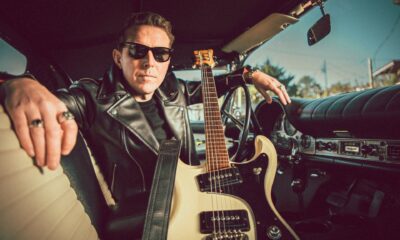
 Alternative/Rock1 week ago
Alternative/Rock1 week agoWilliam Edward Thompson Premieres His Stripped-Down “Sleep Test” Music Video


